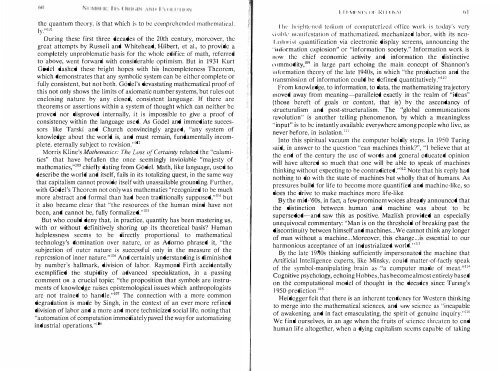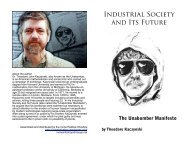CONTENTS - ouroboros ponderosa
CONTENTS - ouroboros ponderosa
CONTENTS - ouroboros ponderosa
Create successful ePaper yourself
Turn your PDF publications into a flip-book with our unique Google optimized e-Paper software.
the quantum theory, is that which is to be comrrehc!l(lcd mathcmatical<br />
ly." lUI<br />
During thse first three decades of th 20th century, moreovr, the<br />
great attempts by Russell and Whitehead, Hilbert, t aI., to provide a<br />
completely unproblcmatic basis for thc wholc edific of math, referred<br />
to above, went forward with considerable optimism. But in 1931 Kurt<br />
Godcl dashed these bright hopes with his Incompleteness Theorem,<br />
which demonstrates that any symbolic system can be either complet or<br />
fully consistent, but not both. Godel's devastating mathematical proof of<br />
this not only shows the limits of axiomatic number systems, but rules out<br />
nclosing nature by any closed, consistent language. If there are<br />
theorems or assertions within a system of thought which can neither be<br />
proved nor disproved internally, it is impossible to give a proof of<br />
consistency within the language used. As GOdel and immediate succes<br />
sors like Tarski and Church convincingly argued, "any system of<br />
knowledge about the world is, and must remain, fundamentally incom<br />
plete, eternally subject to rcvision."1O'<br />
Morris Kline's Mathemalics: The Loss of Certainty relatd the "calami<br />
tics" that have befallen the once seemingly inviolable "majesty of<br />
mathematics,""J3 chiefly dating from Godel. Math, like language, used to<br />
describe the world and itself, fails in its totalizing quest, in the same way<br />
that capitalism cannot provide itself with unassailable grounding. Further,<br />
with Godel's Theorem not only was mathematics "recognized to be much<br />
more abstract and formal than had been traditionally supposed,"!C4 but<br />
it also became clar that "the resources of the human mind have not<br />
becn, and cannot be, fully formalized."'os<br />
But who could deny that, in practice, quantity has been mastering us,<br />
with or without definitively shoring up its theoretical basis? Human<br />
hdplssness secms to be directly proportional to mathematical<br />
technology's domination over naturc, or as Adorno phrased it, "the<br />
subjection of outer nature is successful only in the measure of the<br />
repression of inner nature."!D6 And certainly undrstanding is diminished<br />
by number's hallmark, division of labor. Raymond Firth accidentally<br />
exemplified th stupidity of advanced specialization, in a passing<br />
comment on a crucial topic: "the proposition that symbols are instru<br />
ments of knowlcdge raises epistemological issues which anthropologists<br />
arc not trained to handle."!D7 The connection with a more common<br />
degradation is made by Singh, in the contcxt of an ever more refined<br />
division of labor and a more and more technicized social life, noting that<br />
"automation of computation immediately paved the way for automatizing<br />
industrial operations."!OH<br />
1.II'h·lI NT'> I)!- 1 1 ' 1 ' 11", · \1<br />
!'Ill' l1l'i', htt'tled tnliUIl1 of computerized plTicc work is today's very<br />
visihle 1Il






